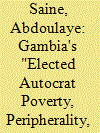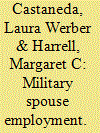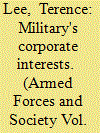|
|
|
Sort Order |
|
|
|
Items / Page
|
|
|
|
|
|
|
| Srl | Item |
| 1 |
ID:
081226


|
|
|
|
|
| Publication |
2008.
|
| Summary/Abstract |
This article examines civil-military relations in Indonesia and the Philippines in the after-math of the largely unexpected recent coup in Thailand. The central issue it investigates is whether Indonesia and the Philippines may prove equally susceptible to military intervention. The conclusion is that although the potential for coups in the Philippines can never be discounted, Indonesia looks surprisingly stable by contrast. One key cause of this apparent stability, it is argued, is the military's role in economic activities, which makes it more or less content with the status quo. Although the dynamics of civil-military relations are significantly different in both the Philippines and Thailand, all three cases suggest that there is a need to take the political economy of civil-military relations much more seriously if we wish to understand them fully in the contemporary era
|
|
|
|
|
|
|
|
|
|
|
|
|
|
|
|
| 2 |
ID:
081225


|
|
|
|
|
| Publication |
2008.
|
| Summary/Abstract |
This article assesses "democratization" under military and quasimilitary regimes in the Gambia following the 1994 coup d'état until 2006. The "transition" program back to "civilian" rule in 1996, the 2001 and 2006 presidential elections, and the aftermath of deepening authoritarianism and economic crisis are also evaluated. The formation of a five-political party coalition, the National Alliance for Democracy and Development, in 2005 raised expectations for a new political dispensation. Its breakup in 2006, however, dashed hope of this occurring. President Jammeh won a third 5-year term amid suffocating external and domestic indebtedness, declining exports, poor economic performance, and endemic corruption. Continued poor leadership and policy choices are likely to exacerbate abject poverty, countercoups, instability, and conflict. McGowan's neo-Marxist/liberal political economy approach has helped rekindle more critical scholarship on the linkage between underdevelopment and conflict in Africa and the Third World as well as provide an antidote to neo-liberal economic policies.
|
|
|
|
|
|
|
|
|
|
|
|
|
|
|
|
| 3 |
ID:
081195


|
|
|
|
|
| Publication |
2008.
|
| Summary/Abstract |
This study responds to the recognition that the majority of military spouses have paid employment but that neither the Department of Defense nor other organizations understand their motivations for work or their perceptions of how the military lifestyle has affected their employment. This article summarizes the input from more than a thousand military spouses who participated in interviews for this research. Qualitative and quantitative methods were used to examine spouse experiences and perceptions regarding their employment. Findings indicate that the majority of military spouses believe that the military has a negative effect on their employment. In addition, the interviews revealed that these spouses work for a variety of reasons, both financial and nonpecuniary. The reasons for the military's negative effect and spouse motives for working are discussed, along with the ensuing implications for policy
|
|
|
|
|
|
|
|
|
|
|
|
|
|
|
|
| 4 |
ID:
081227


|
|
|
|
|
| Publication |
2008.
|
| Summary/Abstract |
"Civil-Military Relations in Indonesia and the Philippines," Mark Beeson argued that the likelihood of future military interventions in Indonesia and the Philippines was best understood by examining the countries' political economies. Beeson contended that because the Indonesian military remains heavily involved in economic activities, it will likely remain politically quiescent. And because fewer opportunities exist for the Philippine military to engage in business undertakings, the specter of further military interventions remains. Beeson's argument is characteristic of the corporate interest perspective in the civil-military relations literature. This article examines the effectiveness of corporate interest arguments in explaining military interventions into the political arena. It advances two main arguments: first, corporate interest propositions are under-specified and not analytically useful to explain military interventions. Second, by concentrating on the corporate interests of the Indonesian and Philippine militaries, Beeson omitted more salient factors that have led to prior interventions in the two countries
|
|
|
|
|
|
|
|
|
|
|
|
|
|
|
|
| 5 |
ID:
081194


|
|
|
|
|
| Publication |
2008.
|
| Summary/Abstract |
Democratization scholars argue that Turkey has successfully transitioned to democracy and is consolidating liberal democracy. The political elite and the parties are deemed important factors in crafting democracies. However, the Turkish political leadership has not changed much until recently; therefore, it remains a puzzle why consolidation is taking place. There are two explanations: (1) there is no consolidation of democracy (2) a factor other than the turnover in political elite/change in the political system has led to consolidation. I argue that consolidation is in progress because of the lengthy but persistent transformation of the military in Turkey. I examine previously overlooked changes in Turkish military with respect to its structure and its relations to the society. I find that the change in the military contributes to the consolidation of democracy in Turkey, and other transitional democracies. As with any other institutional change, this process is slow and risky.
|
|
|
|
|
|
|
|
|
|
|
|
|
|
|
|
|
|
|
|
|